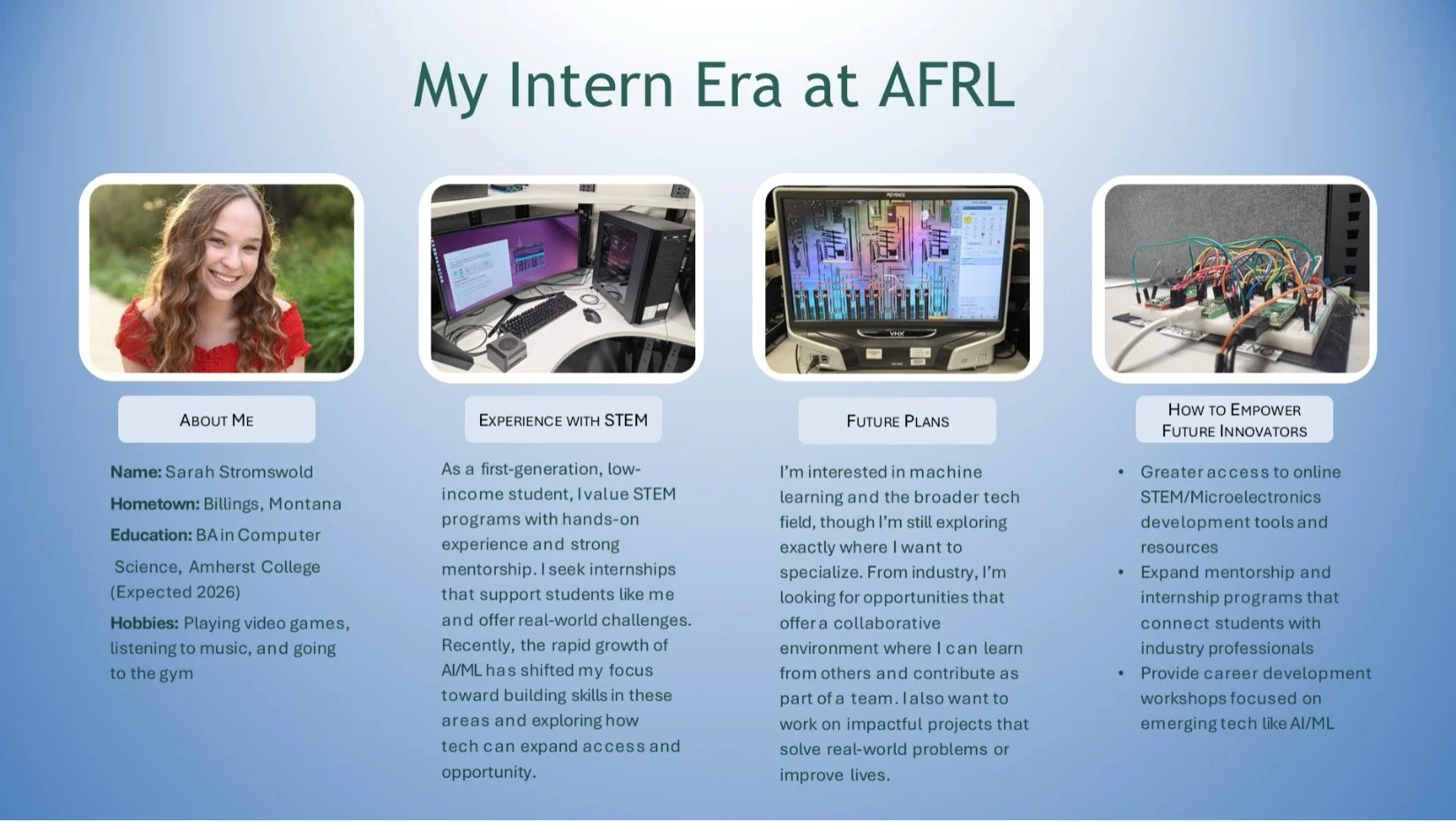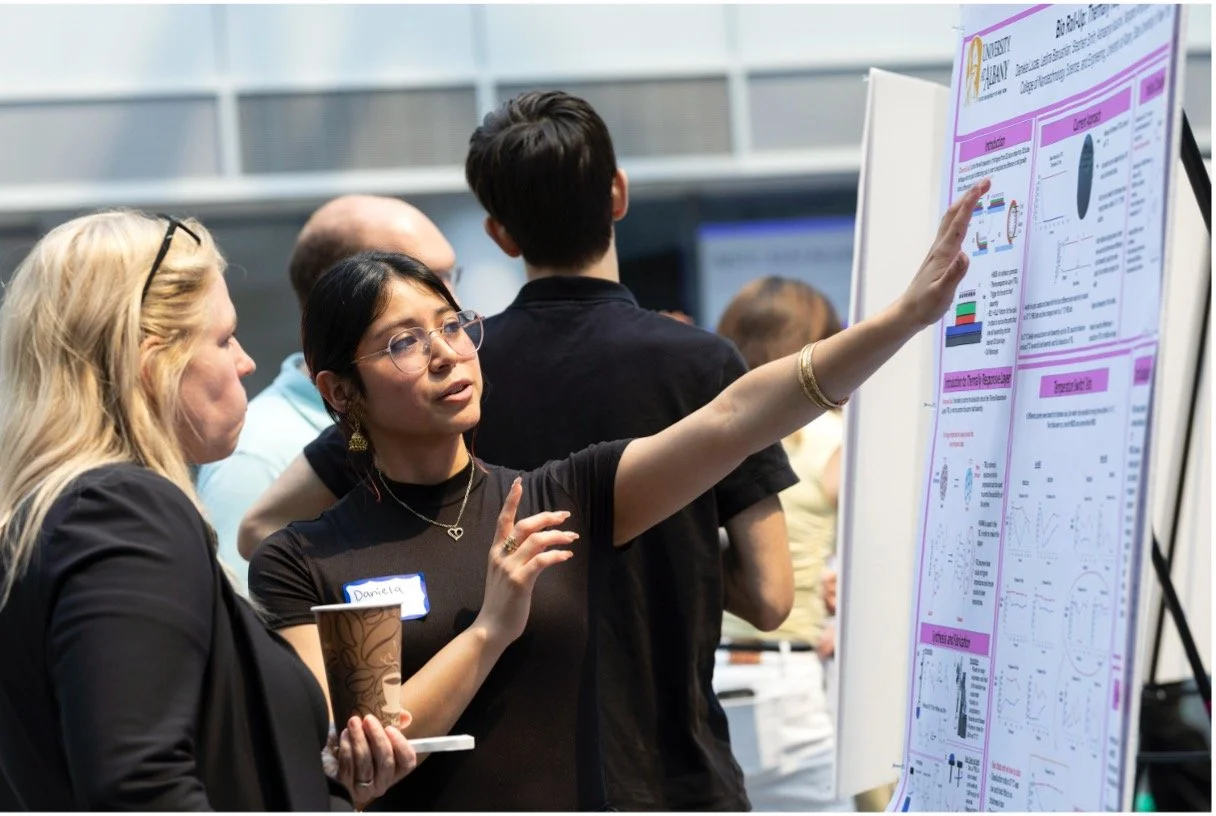NORDTECH Funds Internships to Drive the Next Generation of STEM Talent (Part 2)
“This experience has done more than just build my skills; it has fundamentally opened my eyes to paths I had previously dismissed.” - Shaedil Dider, Electrical Engineering Student
In August 2025, we had the pleasure of introducing you to four future innovators, scientists, engineers, and technicians who are driving innovation in critical defense and microelectronic technologies. This month we continue highlighting the next group of NORDTECH sponsored interns generated from Hub-funded internship programs at NY CREATES, the University at Albany’s College of Nanotechnology, Science, and Engineering (CNSE), the Griffiss Institute and Air Force Research Laboratory (AFRL), and the NORDTECH Summer Internship Program (SIP). Read on to learn more about these students, their summer work, where they are headed next, and what they want to see from semiconductor workforce development.
What do an aspiring Semiconductor Fabrication Professional, a Tinkerer, and Aspiring AI Engineer have in common?
The NORDTECH Summer Internship Program (SIP), in partnership with Griffiss Institute, provides students with hands-on experience in cutting-edge research and technology development. Interns work alongside leading experts, solving real-world challenges in defense, semiconductor, microelectronics, and emerging technologies.
Meet Shaedil Dider, a third-year Electrical Engineering student at The City College of New York, as well as Zbynka Kekula from California, an Electrical Engineering graduate and postbaccalaureate researcher at UC Davis, and Prachi Chheta, who is pursuing a Master’s in Computer Science:
Born a tinkerer, Shaedil Dider’s world revolves around hands-on projects, whether he’s building custom keyboards, composing music on his clarinet, automating his home, or volunteering at his school's makerspace. This passion is what drove him to seek an internship. Here is more about him and his explanation of how valuable the NORDTECH SIP program is—in his own words:
“My name is Shaedil Dider, and as a third-year Electrical Engineering student at The City College of New York, I’ve always been a tinkerer. My world revolves around hands-on projects, whether I’m building custom keyboards, composing music on my clarinet, automating my home, or volunteering at my school's makerspace to help others use the 3D printers and soldering stations. This passion for working on interesting ideas and projects and taking them to the real world is what drove me to seek an internship. I was looking for more than just a line on a resume; I wanted an experience where I could gain hands-on experience and find mentorship. Through the NORDTECH Summer Internship Program during which I worked with Astrabeam LLC and CUNY Advanced Science Research Center (ASRC), I found exactly that, even if it came with a two-hour daily subway commute—but living in NYC without a car, you learn to figure it out.
“This summer, I’ve worn many hats, from designing and validating a PCB for a custom radar sensor to 3D printing mounts to integrate terahertz frontend modules onto a gantry. It has been incredibly rewarding to work on a project where I have some expertise, while also learning new software and professional processes. This experience has done more than just build my skills; it has fundamentally opened my eyes to paths I had previously dismissed. Working so closely with my mentor, Dr. Kevin Gu (also the founder and CEO of Astrabeam LLC) has inspired me to explore entrepreneurship as a potential career path. I am even forming an emergency care electronics startup of my own, which involves a wireless EKG device. Speaking with the graduate students and post-doc researchers in the photonics lab where I work has made me seriously consider pursuing a master's degree or even a Ph.D., something I never thought I would. I’m grateful that NORDTECH connected me with this opportunity, which has helped narrow my focus within the vast field of electrical engineering to electronics and PCB design, particularly with radar integration.
“Looking ahead, my trajectory has become clearer. My plan is to work in the electronics industry until I feel compelled to continue my studies, while still making time to explore the remaining pillars of electrical engineering I haven't yet touched, like electromagnetics and semiconductors. I am, and will continue to be, the intern who asks too many questions because I believe the best work environments are those where you can seek mentorship from experts in the field. I hope that the Microelectronics Commons and the government continue to support and expand programs like NORDTECH's, making these invaluable internships more accessible to undergraduates. After all, investing in students is an investment in the industry itself; who better to hire than someone you have already trained and found value in?
Zbynka Kekula enjoys obtaining hands-on experience in a cleanroom microfabrication facility through the host partner at SRI International and learning about MEMs processes from exceptional mentors. She sees semiconductor fabrication as a professional trajectory.
Zbynka Kekula’s Presentation
Committed to pushing the boundaries of AI and staying aligned with cutting-edge advancements, Prachi Chheta is an aspiring AI Engineer focused on achieving technical excellence and driving innovation.
Prachi Chheta’s Presentation
Sarah Stromswold’s DoD-based Design Experience
Griffiss Institute’s internship program, developed in partnership with the Air Force Research Laboratory’s Information Directorate in Rome, New York, offers students unparalleled opportunities to work on defense-related projects that push the boundaries of technology. The partnership between NORDTECH, Griffiss Institute, and AFRL/RI is more than just an internship program—it is a mentorship-driven experience allowing students to work closely with top defense scientists.
We are pleased to highlight, Sarah Stromswold, a Computer Science major at Amherst College. The rapid growth of AI/ML has shifted her focus toward building skills in these areas and exploring how tech can expand access and opportunity.
Sarah Stromswold’s Presentation
Research and Science Exploration
Future researchers and scientists thrive when provided access to premier professors that help guide them in their studies. This is what happens in the Summer Undergraduate Research Program (SURP) at the University at Albany College of Nanotechnology, Science, and Engineering’s (CNSE). Meet Daniela Lucas from Port Chester, NY, and Sharanya Srivastava, a rising senior at Boston University studying Cell and Molecular Biology.
Daniela Lucas presenting at a poster session
“My name is Daniela Lucas, I’m from Port Chester, NY, and I am a student participating in UAlbany’s Summer Undergraduate Research Program (SURP). I am a chemistry major pursuing a minor in music. A few of my hobbies include playing music, running, reading, and baking. What truly sets SURP apart from other programs is the dedication the instructors have to teach their students as opposed to simply having them do busy work or be an assistance to their graduate students. In my experience with SURP and with working with my instructor, Professor Brainard on his Bio Roll up project, the goal has always been to learn how to be a researcher and gain independence and confidence to work in the field. There have been many times where I had felt discouraged when an experiment I had done hadn’t gone as expected or I hadn’t obtained the data that I was hoping for, but throughout this experience I was reminded that the goal was never to get the perfect data set or carry out the perfect experiment, but rather to learn and grow as a researcher.”
“My future career plans are to become a pharmaceutical chemist, or to work as a researcher in some capacity. SURP has been a great gateway into what being a researcher entails and what going into this career could look like. I would love to find more opportunities like SURP, which offers hands-on experience in a lab or a professional industry, shadowing a profession, and exposure to independent research.”
“Moreover, I think Microelectronics Commons could provide research programs designed for younger students such as high school or middle school students. This would help younger students to start thinking about research as a career and help them to explore what they want to do in the future. I would like to see 4-week program offering, with a handful of students and teach them basic lab skills and introduce them to what being a researcher looks like.”
“Overall SURP has provided me with many opportunities to explore research and the professional field and offered invaluable experiences.”
Sharanya Srivastava’s Presentation
Sharanya Srivastava, a rising senior at Boston University studying Cell and Molecular Biology, is committed to digging deeper into her passions. She aspires to become a physician one day.







